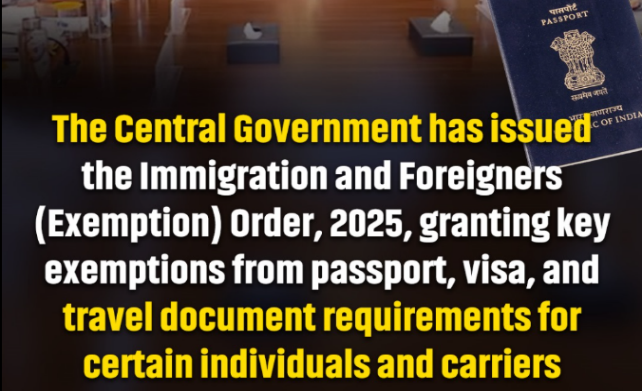PREVIOUS
Immigration and Foreigners (Exemption) Order, 2025
September 13 , 2025
16 hrs 0 min
17
0
- The formulation of the Immigration and Foreigners (Exemption) Order, 2025 was notified by the Union Ministry of Home Affairs.
- It was issued under the Immigration and Foreigners Act, 2025
- This notification replaces the Registration of Foreigners (Exemption) Order, 1957 and the Immigration (Carriers’ Liability) Order, 2007.
- It provides greater clarity on certain issues concerning India’s immigration framework.
- It exempts a set of people from the requirement of a valid passport or other valid travel document and a valid visa to enter, stay and exit the country.
- It covers nationals of Nepal and Bhutan; Tibetan refugees; six religious minorities from Afghanistan, Bangladesh and Pakistan, and Sri Lankan Tamils.
- Citizens of Nepal and Bhutan are exempt from passport and visa requirements when entering by land or air across their borders.
- Naval, Military, and Air Force personnel entering or exiting India on duty, along with their families accompanying them on government transport, are exempt.
- Tibetans registered with Indian authorities and holding valid certificates are permitted.
- Hindus, Sikhs, Buddhists, Jains, Parsis, and Christians who entered India on or before December 31, 2024, due to religious persecution (or fear thereof), are exempted even if they lack valid documents or if their passports/visas have expired.
- All foreigners applying for visas or Overseas Citizen of India (OCI) registration must submit biometric data.
- Illegal immigrants apprehended within India will be confined to holding centres or detention camps pending deportation.
- Foreigners may not climb peaks without prior government approval and liaison supervision.
- Entry into protected or restricted areas requires permits, with nationals of Afghanistan, China, and Pakistan expressly barred.
- A significant aspect is the reference to the Sri Lankan Tamil refugees.
- The order protects them from forcible repatriation to Sri Lanka.
- Registered Sri Lankan Tamils who sought shelter in India up to January 9, 2015, are exempt from restrictions under the Act for purposes of stay and exit.
- Undocumented Sri Lankan Tamil refugees were exempted from penal provisions by a Union Ministry of Home Affairs (MHA) order.
- So the order removes the tag of an “illegal migrant” from registered Sri Lankan Tamil nationals who entered India before January 9, 2015.
- But they are not eligible to apply for long-term visas (LTV)
- Hence it will not immediately help in grant of Indian citizenship.
- one of the main issues affecting mobility of Sri Lankan Tamils was that they had been held to be in violation of the Passports Act, 1967, and the Foreigners Act, 1946 (both Acts are replaced by the 2025 Act).
- LTVs, a precursor to citizenship, are issued for a period of one to five years.
- But foreigners can apply for Indian citizenship under the Citizenship Act, 1955.
- Any foreigner, including a Sri Lankan citizen, may acquire Indian citizenship by registration or naturalisation after fulfilling the eligibility criteria laid down in the Citizenship Act, 1955
- No Sri Lanka refugees who came to India in July 1983 or after should be naturalised/registered under the provisions of the Citizenship Act, 1955
- Sri Lankan Tamils were also not included when the Union government amended the Citizenship Act six years ago to provide citizenship to the six non-Muslim groups from three Muslim-majority countries.
- The September 2 notification also exempted undocumented members of six minority communities from Afghanistan, Bangladesh, and Pakistan from penal provisions and possible deportation if they entered India without passports or visas, or with expired travel documents, before December 31, 2024.
- While the six communities will be able to apply for LTVs, making them eligible to apply for citizenship after at least 11 years of continuous stay in India, Sri Lankan Tamils will not be eligible for the same.
- Members of six minority communities — Hindus, Sikhs, Buddhists, Jains, Parsis, and Christians — from Pakistan, Bangladesh, and Afghanistan, who enter India on valid travel documents “seeking permanent settlement in India with a view to acquiring Indian citizenship” are eligible for LTVs.
- The three other eligible categories are
- Pakistani and Bangladeshi women married to Indians;
- Afghanistan nationals married to Indians in India and staying in India;
- Indian origin women holding Pakistan/Bangladesh/ Afghanistan nationality married there, who wish to return to India due to widowhood/divorce, and having no male members to support them; and cases involving extreme compassion.

Leave a Reply
Your Comment is awaiting moderation.


